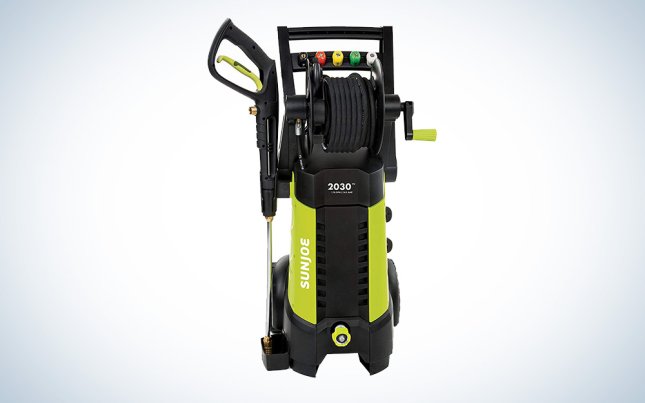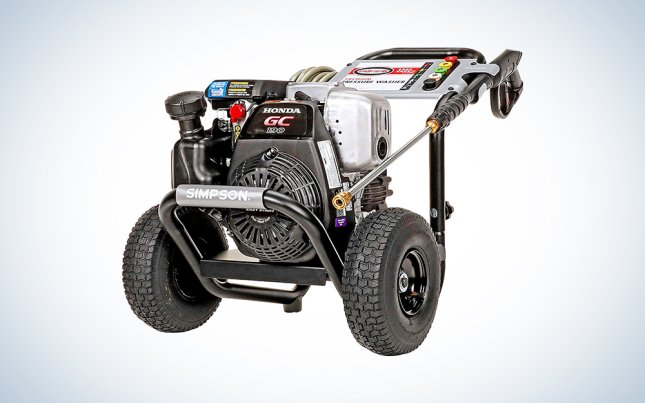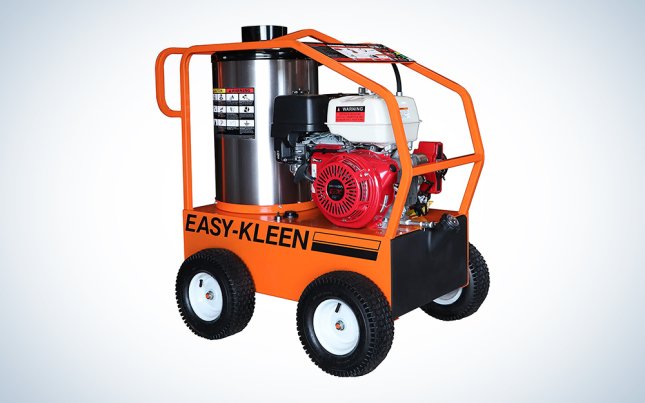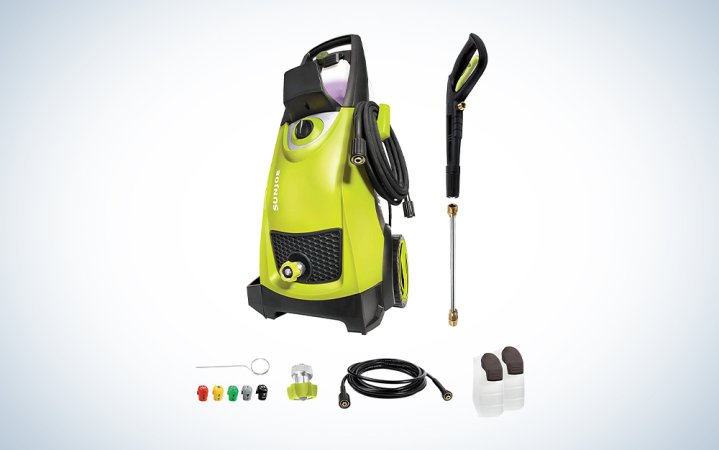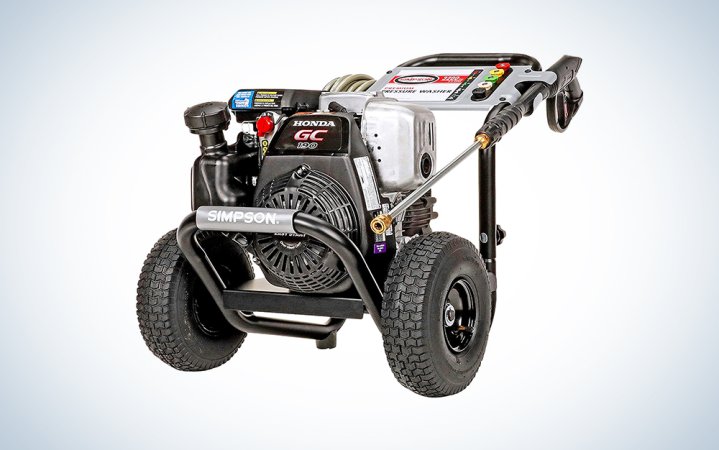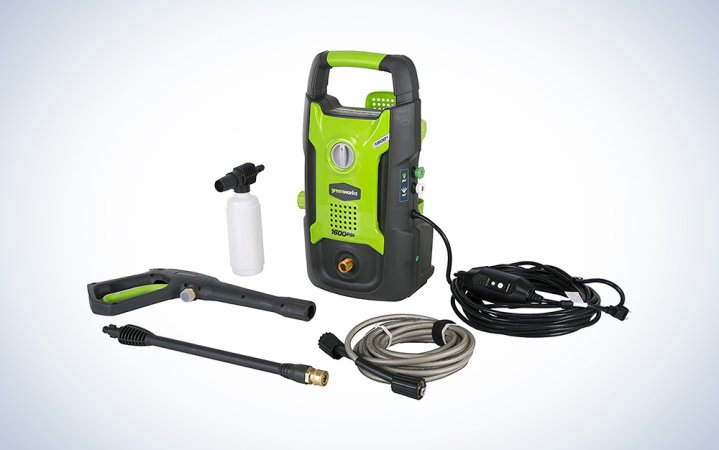We may earn revenue from the products available on this page and participate in affiliate programs. Learn more ›
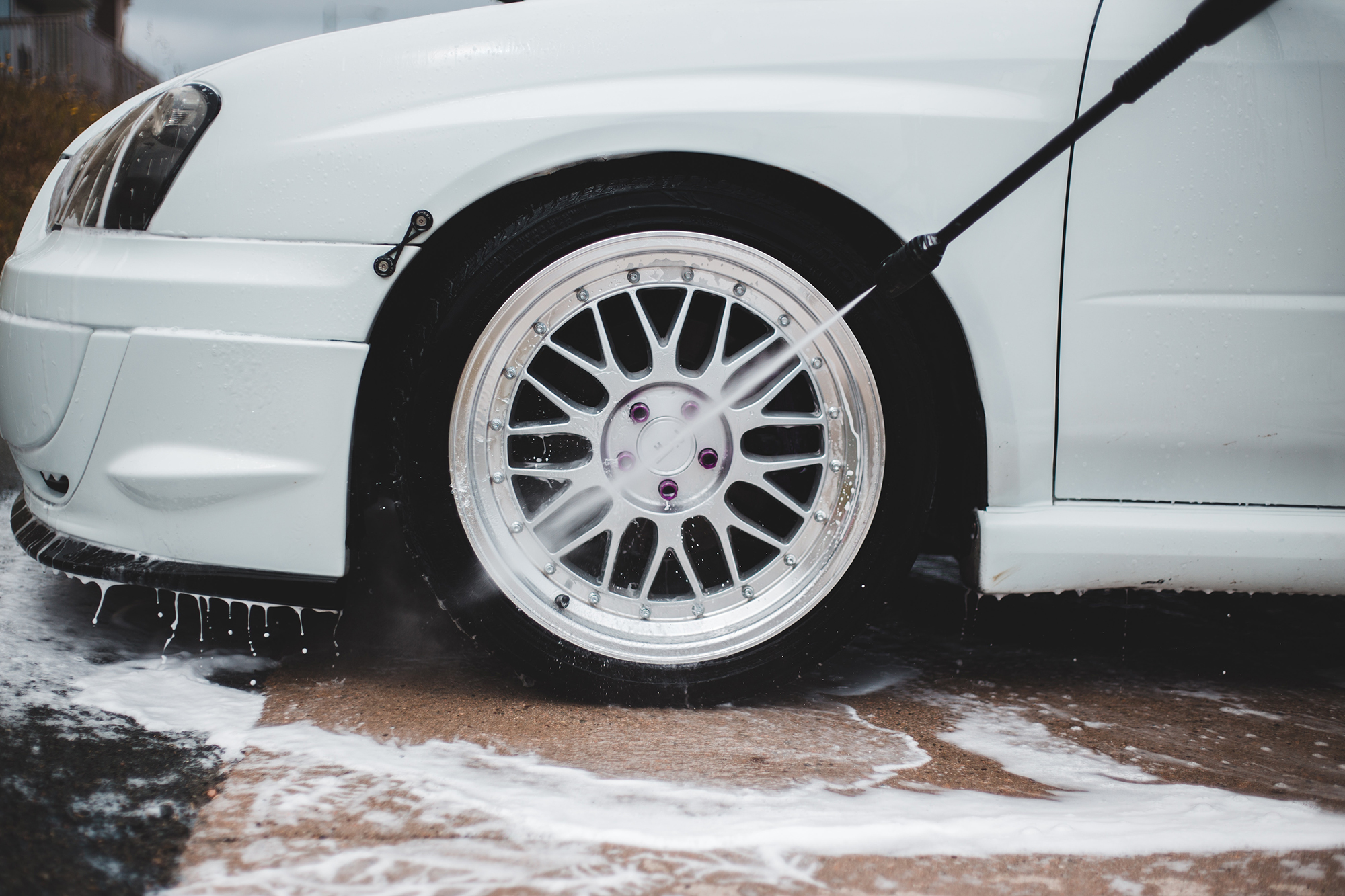
Sometimes getting down on your hands and knees with soap and water just won’t do. Going low with high hopes of scrubbing grimy outdoor surfaces clean can be hard on the knees and murder on the back. The best pressure washers will sweep in to clean excess gunk without requiring any manual scrubbing or stooping down to ground level.
A pressure washer is essentially a power hose connected to a water pump powered by an electric motor or gas engine. It blasts out water at hundreds of times the pressure of the air we breathe, helping users to get both high and low surfaces as clean as possible while standing upright. It’s a garden tool, patio cleaner, and concrete cleaner rolled into one that works on lawn furniture, barbecue grills, cars, and even the outside walls of the house. Here’s how to find one that fits your needs!
- Best electric: Sun Joe Electric High Pressure Washer
- Best gas: Simpson Cleaning MegaShot Gas Pressure Washer
- Best cold water: GreenWorks Pressure Washer
- Best hot water: Easy-Kleen Professional Pressure Washer
The best pressure washers: Reviews & Recommendations
Best electric: Sun Joe Electric High Pressure Washer
Portable and Powerful
This is the best electric pressure washer and it’s loaded with accessories, including two removable detergent tanks, a 35-foot power cord and a garden hose adapter. This Sun Joe pressure washer generates up to 2,030 PSI and 1.76 GPM of water spray.
Best gas: Simpson Cleaning MegaShot Gas Pressure Washer
Rugged Machine
This is the best gas pressure washer and it comes with five nozzle tips of different sizes, including a plastic soap one, as well as an ergonomic high-pressure gun and 10-inch pneumatic tires that can be maneuvered across a variety of terrains.
Best cold water: GreenWorks Pressure Washer
Built for Basic Jobs
The pressure hose can extend up to 20 feet, and the 35-foot power cord is safe to use with exterior outlets. It also comes with two nozzle tips, a soap applicator, and an attachable detergent bottle for added convenience at clean-up time. This GreenWorks pressure washer blasts 1,600 PSI.
Best hot water: Easy-Kleen Professional Pressure Washer
Commercial Grade
This hot water pressure washer will cost you, but it offers optimal cleaning power along with 13-inch pneumatic tires, five easy-to-connect nozzles, and a high-pressure hose that’s 50 feet long with a diameter of ⅜ of an inch. Powered by a Honda gas engine, it releases an ultra-powerful stream of water of 4,000 PSI at 3.5 GPM.
Things to consider when looking for the best pressure washers
Now that we’ve offered a brief overview of what the best pressure washer can do, it’s time to make some big decisions. As you prepare to take the leap into the world of pressure washing, there are at least five big things to consider. First, do you want to go gas or electric? If you’ve got a bigger space to clean, a gas pressure washer may make yard maintenance easier. Second, do you want one that uses hot water or cold water? The answer might mean a hefty price difference.
Next, what are your strength requirements? Pressure washer power is measured in three ways: PSI (pounds per square inch), GPM (gallons per minute), and CU (cleaning units), which is PSI multiplied by GPM. For the record, gas models generally produce a higher PSI and GPM than electric machines, which means they’re faster and more powerful. But that can also mean the loss of paint on your car! So go a bit easier on the force for surfaces that are more vulnerable to chipping and peeling. The fourth consideration is portability. Even if you buy a larger pressure washer, if it’s easy to wheel around and can be stored without too much trouble, the size may not be an issue.
Finally, what nozzles and accessories do you need? Pressure washer accessories like turbo nozzles, trigger spray guns, lances, and detergent injectors are a few of the easy-to-install attachments that can increase the effectiveness of your machine. Once you’ve narrowed down your choices to two or three that tick all the right boxes, the best pressure washer that comes with the most attachments wins.
Should you go with an electric pressure washer?
The first step in choosing a pressure washer is deciding whether to go with a gas or electric model. The best electric pressure washer will be able to push out between 1,800 and 2,000 pounds of water per square inch (a garden hose, in contrast, produces in the neighborhood of 40 PSI), and is lightweight, portable, and low maintenance.
An electric pressure washer typically shoots out water at a volume of 1.3 to 1.5 gallons per minute (GPM). They’re great for smaller items and spaces, but they don’t last as long as gas models, and the power cord limits how far from the outlet source you can stray while they’re turned on. Using an extension cord to further the reach is highly discouraged, so you might not be able to make it far enough to give the fence a good spraying.
Does a gas pressure washer better suit your needs?
The best gas pressure washer will bring extra power to the cleaning game. They tend to have a PSI in the 2,000 to 3,000 range—sometimes more—and are ideal for more intense tasks like cleaning large decks and patios, the side of the house, boats, and utility vehicles. You’ll want one of these if you need to remove a lot of caked-on mud and dirt from a truck or ATV, but be sure to use a low-pressure nozzle to protect the paint.
Although most gas pressure washers are heavy, they often have wheels for portability, and while you must purchase gas or oil to power it, you’ll be able to use it as far away from the house as you need to go. Sure, these machines are more expensive, but depending on your cleaning needs, the extra cost might be worth it.
Is a cold water pressure washer strong enough?
When you buy a machine for home use, it will most likely be a cold water pressure washer. These are budget models compared to the hot water models, costing up to thousands of dollars less. These are the best pressure washers for cars and accomplishing other modest goals like removing dirt, loose paint, and mildew from outdoor surfaces.
Should you go for a hot water pressure washer?
For particularly stubborn grime, a hot water pressure washer uses heat to increase its power washing game. Cold water pressure washers tend to be more portable, but hot water models are the ones to turn to for tackling massive cleaning jobs. As pressure washer surface cleaners go, they’re best reserved for materials like concrete and cement that can withstand the heat.
Commonly reserved for industrial and farm use, hot water pressure washers are considerably more expensive and are more complicated to use. The extra cleaning power means you’ll need less detergent and cleaning chemicals to do the job.
Best pressure washer on a budget: What you can get for under $120
Power washers cover a fairly wide price range, and if you go gas instead of electric, you’ll end up paying more for the added machine power. Meanwhile, a hot water pressure washer can come with a four-digit price tag. But don’t despair if you are on a tight budget with a lot of outdoor surfaces to clean. You may have to skimp on a few extras, but there’s no reason why you cannot get a perfectly efficient pressure washer without spending much more than $100. Here’s the best pressure washer we’ve found for less.
FAQs
A good PSI for a pressure washer for smaller jobs around the home is between 1,300 and 1,900, with a water flow of 2 gallons per minute (GPM). Medium size jobs require a PSI between 2,000 and 2,800, with a 2 to 3 GPM. For dirtier concrete surfaces, experts suggest a PSI higher than 2,800 and a GPM of 3 to 4.
A safe PSI for washing a car that shouldn’t damage the paint is between 1,200 and 2,200. If you go below that range, your car will be protected from paint loss, but you probably won’t get it properly cleaned with just a pressure washer.
A pressure washer pump should last at least 500 hours, which in an average household, will keep it going for around 10 years. The pump is the most important part of a power washer (a consideration that is right up there with PSI and GPM), and it will most likely fail before the engine does.
The bottom line on finding the best pressure washers
Whether you go electric or gas, hot water or cold water, the best pressure washer makes yard maintenance a lot easier. The type you choose will depend on the magnitude of your cleaning jobs (the higher the PSI and GPM, the more water power you’ll get), the pressure washer accessories, and your budget. Although prices range from the low hundreds well into the thousands, you can go lower and still get a high-quality machine. Of course, nothing this good can possibly last forever, but the best pressure washer can still clean effectively up to a decade after you buy it, maybe even longer.
